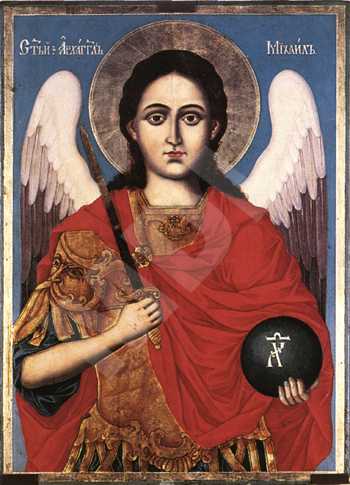St. Archangel Michael
Type:
Icon
Period:
From
the beginning of the
19 century
to
the end of the
19 century
Dimiter T. Molerov, born in 1780 in Bansko, son of Toma Vishanov the Moler. One of the best-known painters, a representative of the Bansko school of art, a disciple of his father, influenced by the art of Athos. Author of the murals of the naos in the St Archangels' paraclete in the Rila monastery, the murals in the Church of the Assumption of the Virgin in the Pchelino dependance. In 1840 and 1841 together with his son Simeon Molerov he paints the murals and the sponsors' portraits in St. Nicholas' and St. John of Rila's paracletes in the principal church in the Rila monastery. Among D. Molerov's major achievements in iconography are the following icons: St. Nicholas (1816) from St. Archangel Michael's church in the village of Leshko, Christ All-triumphant with Angels and Cherubim (1833), The Nativity and a Crucifixion from St Elijah the Prophet's church in the village of Usenovo. He has also worked in Belgrade on an invitation by Prince Milosh Obrenovich of Serbia. He died in 1870 in Bansko.
Dimmensions (cm):
61
/ 44
/ 2
Location
Country: Bulgaria
Province: Blagoevgrad
Village: Godlevo
Church: The Assumption of the Virgin
Source
Country: Bulgaria
Province: Blagoevgrad
Village: Godlevo
Description
A traditional composition, with a to-the-waist portrait of Saint Archangel Michael against a light-blue background. He holds a sword in his right hand, and in his left hand - a medallion with the initials of Christ. The armour of the saint is gilded and richly painted. On his shoulders he wears a red mantle. The figure of the archangel in the composition is represented with a great skill. The transitions from shade to light are smooth, the face and the hands are painted with an unusual precision, which betrays the hand of a very good iconographer.
Iconographical technique: Semi-oil
The varnish cover is applied thinly and evenly.
Base material: Wood
The icon's base is made of two panels, joined by means of two inserted beams. The ground coat is of plaster, thinly laid.
State, restoration traces and comments
There are no traces of any previous restorative intervention.


